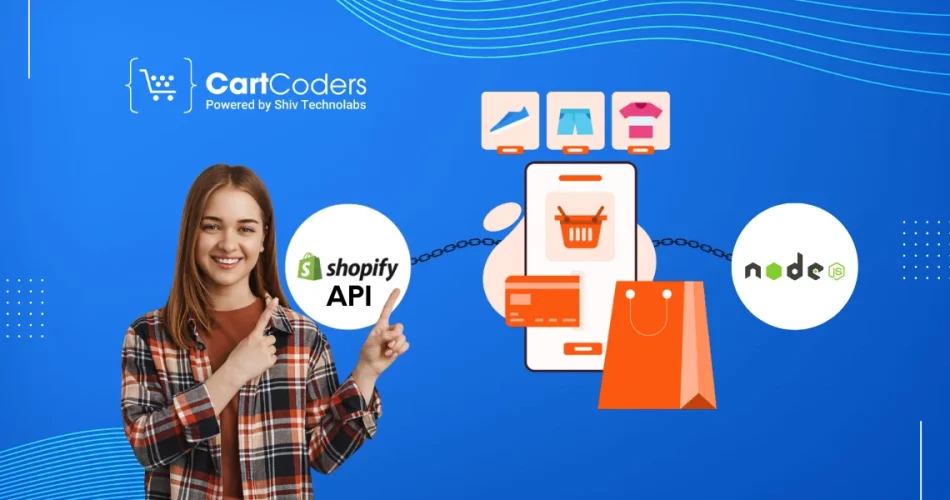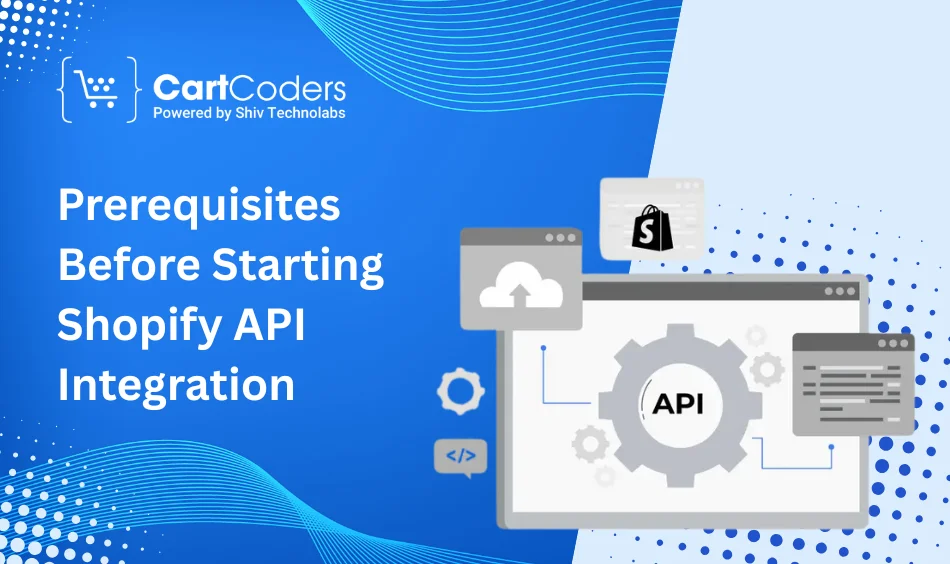Custom Engagement Solutions
Unlock tailored solutions with a free, no-obligation strategy session.
Expert Developers & Engineers on Demand
Scale Your Team with Skilled IT Professionals
Expert Guidance for Digital Transformation

Connecting to the Shopify API using Node.js opens up a wide range of possibilities for building apps, automating store operations, and creating real-time integrations with Shopify stores. As Shopify continues to grow as a leading eCommerce platform, developers are increasingly building apps and services to extend Shopify’s capabilities.
At CartCoders, we specialize in building solutions that integrate directly with Shopify. In this guide, we’ll break down how you can set up a Node.js environment to securely connect and interact with the Shopify API.
Whether you’re building a public app for the Shopify App Store or a private integration for a specific client, this step-by-step walkthrough will help you understand what’s required and how each part fits together.
Let’s get started.
Shopify provides APIs (REST and GraphQL) that allow developers to interact with store data such as products, orders, inventory, customers, and more. This data access makes it possible to create powerful apps, automate business workflows, and build integrations between Shopify and third-party systems.
Node.js is one of the most popular choices for handling Shopify API requests because:
By connecting the Shopify API to Node.js, you can build scalable apps that interact with Shopify in real time.
Also Read: Shopify’s Python API Integration

Before writing any code, make sure you have the following ready:
If your goal involves building a Shopify third-party API integration, having these essentials in place will help you connect external services or applications to your Shopify store through a secure and reliable setup.
Here’s how you can connect Node.js with the Shopify API using REST.
Create a new project folder and install dependencies.
bash
mkdir shopify-api-node
cd shopify-api-node
npm init -yInstall the required packages:
bash
npm install express axios dotenvInside the root folder, create a .env file:
.env
ini
SHOPIFY_API_KEY=your_api_key
SHOPIFY_API_SECRET=your_api_secret
SHOPIFY_STORE_URL=your-store.myshopify.com
SHOPIFY_ACCESS_TOKEN=your_access_tokenDo not expose these credentials in your code. Use environment variables to keep sensitive data secure.
Create index.js and set up a basic server.
index.js
javascript
require('dotenv').config();
const express = require('express');
const axios = require('axios');
const app = express();
const PORT = 3000;
app.get('/', (req, res) => {
res.send('Shopify API with Node.js');
});
app.listen(PORT, () => {
console.log(`Server is running on http://localhost:${PORT}`);
});Visit http://localhost:3000 to confirm the server is working.
Now, add a new route to fetch products from Shopify using the REST API.
javascript
app.get('/products', async (req, res) => {
const url = https://${process.env.SHOPIFY_STORE_URL}/admin/api/2023-10/products.json`;
try {
const response = await axios.get(url, {
headers: {
'X-Shopify-Access-Token': process.env.SHOPIFY_ACCESS_TOKEN,
'Content-Type': 'application/json',
},
});
res.json(response.data);
} catch (err) {
console.error('Error:', err.response.data);
res.status(500).send('Failed to fetch products');
}
});Now, visiting http://localhost:3000/products should return your Shopify store’s product list.

If your app needs to respond to store events (like order creation or product updates), use Shopify webhooks.
Here’s an example of a webhook endpoint:
javascript
app.post('/webhooks/orders/create', express.json(), (req, res) => {
const orderData = req.body;
console.log('New Order:', orderData);
res.status(200).send('Webhook received');
});You’ll need to register this webhook via the Shopify admin or API.
Authentication is critical when building apps that connect to the Shopify API. There are two approaches:
If you’re building a public app:
Always verify request integrity using HMAC signatures.
Integrating Shopify API with Node.js offers a reliable and scalable solution for businesses that want to manage store data, automate workflows, and build custom applications. Below are the key advantages:
Node.js is well-suited for handling asynchronous operations, allowing your application to interact with Shopify’s API without delay. This is especially useful for pulling live product data, managing inventory, or processing customer information on demand.
Node.js enables the automation of repetitive tasks such as order fulfillment, inventory updates, customer tagging, and shipping notifications. This reduces manual work and helps improve accuracy and consistency across your store operations.
Security is a priority when working with Shopify’s API. Node.js supports secure protocols and works efficiently with OAuth authentication, allowing you to build trusted and authorized connections between your application and Shopify.
Node.js uses a non-blocking, event-driven model that supports a large number of simultaneous API requests. This makes it an excellent choice for businesses with growing traffic or complex app workflows that require real-time responses. As your Shopify app grows, a well-planned Node.js development approach can help maintain speed and stability.
Whether you’re building a public Shopify app or a private tool for internal use, Node.js allows for flexibility in design and functionality. It supports various use cases, including admin dashboards, storefront apps, and custom Shopify third-party API integration.
Webhooks are essential for staying informed about store events like order creation, customer signups, or product changes. Node.js is capable of listening to and processing these webhooks in real time, allowing you to take immediate action based on store activity.
Here’s how businesses and developers use this setup:
CartCoders has worked on similar projects where syncing Shopify with external platforms helped clients reduce manual work and increase accuracy.
Want to build a Shopify app or automate your store backend? CartCoders, a trusted Shopify development company, delivers custom solutions using the Shopify API and Node.js.
As a reliable Shopify development partner, we help businesses create scalable apps and integrations tailored to their operations. Whether you need private integration or a full-featured app, our Shopify app development services are designed to match your goals.
Get in touch with CartCoders to kickstart your project.
Connecting your Node.js app to Shopify’s API opens up many possibilities—from automation to full app development. With a reliable setup, you can build everything from simple order notifiers to complete back-office solutions.
If you’re a developer building a Shopify integration or a business looking for a custom solution, this guide provides the foundation to start building.
Projects delivered in 15+ industries.
95% retention rate, building lasting partnerships.
Serving clients across 25+ countries.
60+ pros | 10+ years of experience.